Cognitive Therapy for Dementia from Peter R. Johnson
$109.00 $32.00
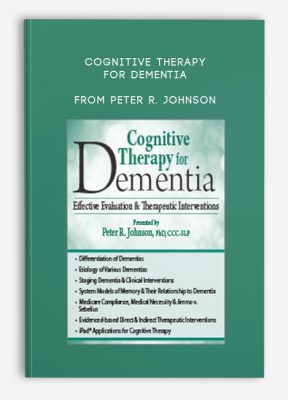
Cognitive Therapy for Dementia Effective Evaluation, Therapeutic Interventions from Peter R. Johnson
Faculty:Peter R. Johnson
Duration:6 Hours 40 Minutes | Format:Audio and Video
Archive : Cognitive Therapy for Dementia from Peter R. Johnson
Get Cognitive Therapy for Dementia from Peter R. Johnson on Salaedu.com
Outline:
- Cortical & Sub-cortical
- Static or Dynamic/Reversible
- Alzheimer’s
- Parkinson’s
- Vascular Dementia
- Huntington’s
- Lewy Body
- Frontotemporal Dementia
- Wilson’s
- PSP
- Cerebral Degeneration
- Basil Ganglia Degeneration
- Etiology & Symptoms
- Sensory Memory
- Working Memory
- Declarative Memory
- Non-declarative Memory
- Jimmo v. Sebelius – Impact on treatment
- Brief Cognitive Rating Scale
- Global Deterioration Scale
- St. Louis University Mental Status Test (SLUMS)
- Stroop Test
- Trails A & B
- Cognitive Linguistic Quick Test
- Scales of Cognitive and Communication Ability for Neurorehab (SCCAN)
- Environmental and Communication Assessment Toolkit for Dementia (ECAT )
- MCI Screen
- Allen Crosswalk & Cognitive Levels
- Spaced Retrieval
- Priming
- Reminiscence Therapy
- Medications
- Montessori Principles
- Allen’s Techniques
- Chaining Techniques
- Attention Training Techniques
- Sensory Stimulation Techniques
- Errorless Learning Techniques
- Meta-memory Exercises
- Cognitive Rehab Dining
- Appropriate iPad® Apps for Cognitive Therapy
- Environmental Adaptations
- Assistive Techniques for Cognition
- Simulated Presence Therapy
- Linguistic Manipulations
- External Aids
- Caregiver Education
Get Cognitive Therapy for Dementia from Peter R. Johnson on Salaedu.com
Description:
- Differentiation of Dementias
- Etiology of Various Dementias
- Staging Dementia & Clinical Interventions
- System Models of Memory & Their Relationship to Dementia
- Medicare Compliance, Medical Necessity & Jimmo v. Sebelius
- Evidenced-based Direct & Indirect Therapeutic Interventions
- iPad® Applications for Cognitive Therapy
This invaluable workshop focuses on the variables associated with learning for cognitively impaired patients. You will learn the characteristics of dementia for effective differentiation as well as how to accurately stage your patients. Take away an array of therapeutic approaches based on the patient’s diagnosis and stage level for successful intervention. This seminar will broaden your understanding of memory and pharmacology and provide evidence-based direct and indirect interventions to help you find the right approach for each patient. Additionally, you will discover how to fully comply with the recent Medicare policies and how these changes will impact treatment of your patients.
Key benefits:
- Differentiate cortical and sub-cortical, static and dynamic, and reversible cognitive impairment
- Determine the patient’s stages of dementia to modify intervention practices
- Differentiate the forms of memory and the dementia diagnosis associated with each form
- Document cognitive therapy for adult patients with dementia in accordance with Medicare guidelines
- Utilize peer reviewed research regarding treatment strategies
- Explain environmental adaptations utilized for the patient with dementia
- Utilize visual cues during therapy to facilitate memory
- Understand Jimmo v. Sebelius implications for therapy
1 review for Cognitive Therapy for Dementia from Peter R. Johnson
Add a review Cancel reply
Related products
HEALTH - FITNESS - LIFESTYLE - MEDICAL
HEALTH - FITNESS - LIFESTYLE - MEDICAL
HEALTH - FITNESS - LIFESTYLE - MEDICAL
HEALTH - FITNESS - LIFESTYLE - MEDICAL
HEALTH - FITNESS - LIFESTYLE - MEDICAL
HEALTH - FITNESS - LIFESTYLE - MEDICAL
HEALTH - FITNESS - LIFESTYLE - MEDICAL

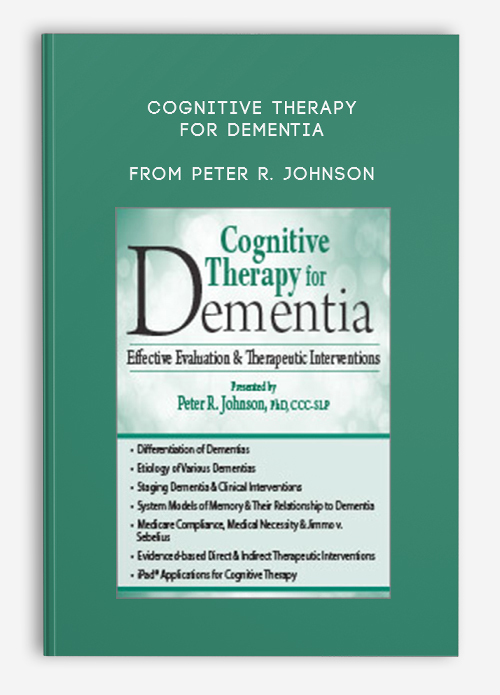
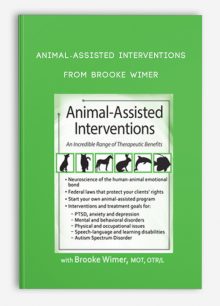


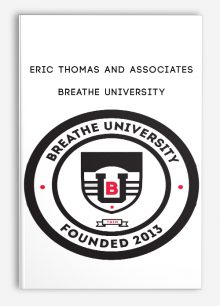


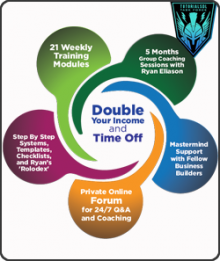

king –
“Excellent course covering a wide range of content. Love Dr. Johnson as a presenter–I’ve also been to this seminar and still learned ALOT. He is personable and extremely knowledgeable, and his personal experiences add much to the presentation. Thank you “